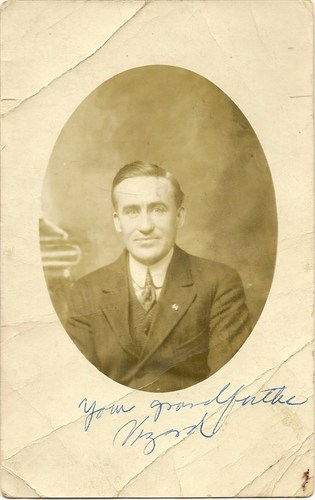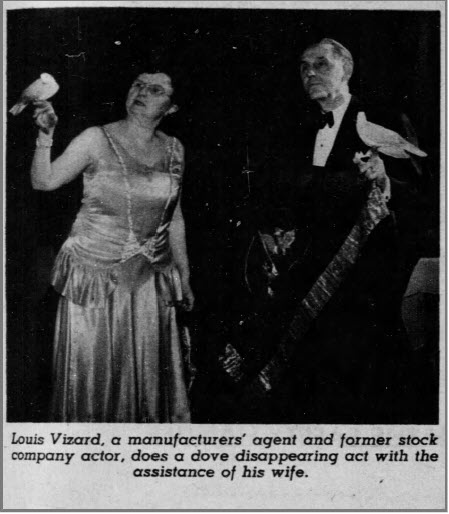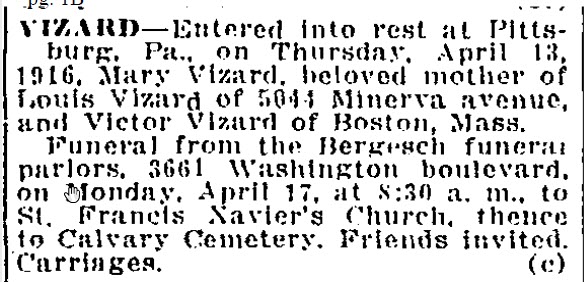
I laughed out loud at a stop light when I read Victor’s death certificate.
I’d just gathered the envelope from the mailbox on my way out of the house, and could not wait to see what Victor had left me to know about his ancestors.
The fine document from Stoningham, Massachusetts with an embossed golden seal lending it authenticity bore the two lies that had already set me on a futile quest to find my Cajun and Colonial Puritan ancestors in the preceding 4 years.
I laughed because I knew, just knew, that this lie was probably on its way to me riding in an official government vehicle. But now I had it, with a personal flair dreamed up by a man gone since 1930, and it was almost wonderful:
“Lucien Vizard”
My own father Mark, Victor’s grandson, had written on a hand drawn family tree that our great grandfather Victor Vizard’s Cajun father came up on foot from Louisiana to New England. I learned from Dad about the sad history of our Acadian diaspora family forcibly removed to ships by the British from Acadian Canada. I had walked the streets of New Orleans one year telling friends that my ancestors might well have walked and worked in this very place. I wondered if my ancestors had ever said, “Beignet.
“Victor’s mother was given as a “Pierce” from the clan of President Franklin Pierce fame in my dad’s tree. (Why that president, of all of them? For his relative insignificance, perhaps? Who would ever bother to question it and thereby discover the fib?) In this document, she was given as having been born in “Deering, Maine”, which lent a bit more American origin than Quebec, where I was destined to learn later was her birthplace, to Irish immigrants. In any case, my immediate family enjoyed looking at a picture of Franklin Pierce and seeing if we could find a resemblance (the curls, the deep-set eyes?)
Victor’s death certificate reflected what he’d told his Irish-born wife. That his father was the majestically French-sounding…Lucien Vizard. The only person really bearing this name in North America was a young man who died in Ohio some years before Victor claimed to have been born. No such person existed anywhere near Buffalo, New York, where Victor claimed birth. Nor in Louisiana. Nor in New Brunswick where I suspect Victor was really born, as William, the only other son alive in 1881 with his brother Louis. A William who disappears completely after that 1881 Canada census. At this point, I’ve plenty of other evidence to tie Victor simply to brother Lou and mother Mary Rogers. (“She was a RAW-juhs, not a Pierce” explained my dad’s brother. Pierce was guessed to be farther back though not known.)
And also to tie them to their actual father, Michael Vizard from County Mayo, Ireland.
Paper and DNA tests tie us directly to multiple 3rd cousins all sharing the same County Armagh Rogers couple in St-Roch parish in Quebec City. I thought for a moment in a bid to make “Lucien” make sense, “Maybe Michael the Irishman had a fancy French brother Lucien who randomly visited Mary on the sly one day around Christmas in 1876 during their 26 year marriage?” But of course, the Vizard surname is known to be English and Irish nowadays even if originally Norman, and DNA shows no Cajun or Canadian French heritage whatsoever.
Why the lie? The erasure of the father? Was it about Victor himself? Was it truly about his father Michael and shame about who Michael was? If Michael was so bad, why did Louis not also change the identity of his dad, or the birthplace of his mother?
The boys grew up under different conditions, this much I do know:
I’d had a great deal of frustration trying to find Victor with the family as he never shows up in censuses under the name Victor as brother Lou does. When I asked my aunt, she lit up and said, “THAT’S right. Victor was put to live with another family. A rich aunt and uncle. He grew up in the lap of luxury, but learned no useful skills. They died when he was a young adult, and left him nothing in their will because he was not their own child. He was left to fend for himself with no skills, but still having his fancy tastes.
“Louis, on the other hand, had remained with his family. After their father Michael Vizard disappeared around 1891, Mary lived with one wealthy family or another as a laundress, along with little Louis. Mary Rogers performed this arduous work her entire adult life until her death in 1916 at the age of 69 while in the employ of the Wolff family at 6217 5th Avenue (“Millionaire’s Row”) in Pittsburgh, far from her birth in Quebec City, Canada to two immigrants from County Armagh, Ireland in 1847. Hard, honorable work. (And yes, not related to the president nor the Mayflower passengers.)
Louis J. Vizard grew up in St. Catharines, Ontario, and after a time as a hotel clerk in Buffalo, he moved on to the stage, acting in both silent films and Broadway, mostly traveling with shows. He settled in St. Louis and was married and widowed twice, with no children. He had a successful cigar store and enjoyed active participation in local magic scene with his second wife Marie Summa Vizard, even serving as president of the IBM Ring One (magic society) in St. Louis.
Louis and wife Marie performing magic for charity in 1941
(St. Louis Post-Dispatch (St. Louis, Missouri)21 Dec 1941, SunPage 81)

Something made Victor rewrite his family story.
And something let Louis be at peace about it.
Maybe Louis got to see and perform hard work and struggle up close early on and through his adolescence until he could strike out on his own. Any advancement in life was a credit to him, so he owned it and his parents with pride. When his hard-working mother died, he brought her out to St. Louis, to be buried in his lovely family plot with a fine funeral procession with carriages provided for mourners.

Maybe Victor viewed his own, more plush childhood with confusion. A mixture of growing entitlement and shame about his actual origin. Without skills or an inheritance and a failure to match this experience, a new identity simply felt better. Whatever Victor’s failings, my uncle suggested thoughtfully, “He did manage to provide well for two daughters, even so.”

What of Michael, though? Who was this not-Lucien-the-Cajun? This I know about Michael:
- Fled the Famine in Ireland as a 10 year old with his mother and father from the hard hit Kiltimagh parish in County Mayo, landing in Macclesfield — the silk center of England.
- Worked as a child laborer in the silk mills until his mother died of consumption around his 19th birthday in 1856.
- Joined the British Army right after his mother died, and just before his father Patrick remarried.
- Traveled to Gibraltar, Malta, and ultimately what became Canada in the service of Queen Victoria in the early 1860’s. It seems likely this Irish-born soldier was sent there to help put down Fenian raids, to suppress the pro-Irish movement in British North America.
- Met and married Mary Rogers, a local girl, in Quebec in 1865 in the Anglican Garrison.
- Discharged from the army in 1874 so he could move his family to the Niagara peninsula. His officers rated Private Vizard a “generally good” soldier with two good conduct medals. (He had earned 4, but lost 2 due to drunkenness, including losing a promotion once for the same cause.)
- They had 3 boys by 1876, but lost two of them in one brutal summer to cholera and scarlet fever. Only William born 1868 was left.
- Gained and lost a little girl Louisa in 3 short months at the end of 1877 — the same time Victor claimed he was born. He is nowhere in the Parish registry with Louisa. He does not look to have been her twin. He is not in the 1881 census — unless Victor is really William… which seems most likely as of now.
- Louis is born in 1880 and turns up with brother William in the 1881 census.
- Civilian life meant one sort of job after another. In every city directory and census he has a different job from the previous…
- bartender,
- coachman,
- grocer (“Sold out by Sheriff” in 1884),
- tanner in 1891….And the trail ends there, with Mary claiming to be a widow and living with just 10 year old Louis in another family’s home in 1891.
Victor/William may have been there for all the death and sadness in the 1870’s, and somewhere in the 1880’s missed the job-hopping and struggles. I do not know.
His daughter had described him as a ne’er do well who never held the same job for too long. She described never getting to see their uncle Lou except one time up on a silent movie screen. I know that Lou sent Victor at least one picture, which I hope to see one day.
As I reflect on Victor’s choice to change his history, I know that I absorbed his revisions and that it captured my imagination. This is the story that pulled me into genealogy to begin with. We “felt” like just an Irish American family to me, and I was amazed to think that we had hidden Cajun flavor, and deep Colonial Founding Family roots. It didn’t feel real, but I felt proud of it as a young person and hoped to confirm it with research.
What’s funny is that I did not experience any disappointment to find that, instead, Victor’s parents were just two more poor Irish immigrants out of nothing but Irish immigrants in our line. That they were just what we seem to be all along.
Pingback: Meredith Rogers: From Armagh to Augusta | Bothering My Family
Very interesting! My Vizard ancestors were living in Cambridge ,Mass at the same time.We knew very little about my dad’s family then, his mother Josephine only knew that her grandfather had emigrated here in the 1800s and that they were French. Turns out they were from Wiltshire, England going back at least 6 generations. I love the unexpected finds!
Thank you, Laura! Yes, I wanted to be a Cajun French person so much, but reality is fun, too. 🙂
I’ve got some Gedmatch DNA matches whose Vizards are from Wiltshire, by the way. A match and I are sharing with Wiltshire Vizards, so we might be cousins for real!
Pingback: I’d Like to Meet | Bothering My Family